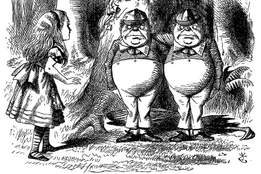‘Blizzard’
Lookups for blizzard have been high in conjunction with Winter Storm Blair.
Winter Storm Blair has swept into the mid-Atlantic with heavy snow, prompting winter storm warnings for millions after burying parts of the Plains in their heaviest snowfall in years over the weekend. … Blizzard criteria was reached in Topeka, Salina, Dodge City, Russell, and Gardner, Kansas; and in St. Joseph, Missouri. Kansas City experienced near-blizzard conditions.
— Jonathan Belles et al., Weather.com, 6 Jan. 2025
The earliest recorded appearance of the word blizzard meaning “a severe snowstorm” was in the April 23, 1870 issue of a newspaper published in Estherville, Iowa. Blizzard shows up again during the following years in several newspapers in Iowa and neighboring states, and by 1888, when a snowstorm blanketed the Eastern seaboard, the word was well-known nationally. However, in other senses, the word blizzard existed earlier. Davy Crockett, for instance, used it twice in the 1830s, once to mean a rifle blast and once to mean for a blast of words. All of these uses seem related, but the ultimate origin of the word is still unclear.
‘Homily’
Lookups for homily saw a spike on the morning of the state funeral for former president Jimmy Carter.
The state funeral for Jimmy Carter at Washington National Cathedral on Thursday will include tributes from members of his family and two presidents — President Biden and Gerald R. Ford, who died almost two decades ago. Mr. Ford’s eulogy will be read by his son Steve. ... Readings will be offered by Jason Carter and Joshua Carter, another grandson, and Andrew Young, the civil rights leader who served as Mr. Carter’s ambassador to the U.N., will deliver a homily.
— Peter Baker, The New York Times, 9 Jan. 2025
The history of homily starts with the ancient Greek word homilos, meaning "crowd" or "assembly," and travels through related Greek words homilein, "to address," and homilia, "conversation, discourse." Homilia eventually takes on the "usually short sermon" meaning in our modern homily, and then is incorporated into the Latin used by writers of the early first millennium. It reaches English speakers of the 14th century by way of Anglo-French, but when it arrives it's spelled omelie. By the mid-16th century the "h" is back, and the "y" of the modern spelling has found its place.
‘Palisade’
Lookups for palisade rose mid-week as deadly wildfires raged through southern California, including the community of Pacific Palisades.
A wildfire whipped up by extreme winds swept through a Los Angeles hillside dotted with celebrity residences Tuesday, burning homes in Pacific Palisades and prompting evacuation orders for tens of thousands. In the frantic haste to get to safety, roadways were clogged and scores of people abandoned their vehicles and fled on foot, some toting suitcases.
— Jaimie Ding et al., The Associated Press, 8 Jan. 2025
We define the relevant sense of palisade as “a line of bold cliffs.” Palisade comes from Latin palus, meaning “stake.” The word originally applied to one of a series of stakes set in a row to form an enclosure or fortification. In time, its meaning was extended to a fence of stakes and, by association, to stretches of steep cliffs bordering a river (or in the case of Pacific Palisades, the Pacific Ocean).
‘Meatspace’
An article about AI published in The Guardian this week led to increased traffic to our entry for meatspace.
How do you do, fellow humans? My name is Arwa and I am a genuine member of the species homo sapiens. We’re talking a 100% flesh-and-blood person operating in meatspace over here; I am absolutely not an AI-powered bot. I know, I know. That’s exactly what a bot would say, isn’t it? I guess you’re just going to have to trust me on this. I’m taking great pains to point this out, by the way, because content created by real life human beings is becoming something of a novelty these days. The internet is rapidly being overtaken by AI slop.
— Arwa Mahdawi, The Guardian, 8 Jan. 2025
We define meatspace as “the physical world and environment especially as contrasted with the virtual world of cyberspace.” This compound noun began being used in the early to mid-1990s, and is thought to be patterned after the earlier cyberspace (“the online world of computer networks and especially the Internet”), which dates to the early 1980s.
Word Worth Knowing: ‘Frostbiting’
You may, hopefully not from experience with the condition, be familiar with frostbite as a noun referring to the freezing, whether superficial or deep, of bodily tissues—especially of one’s feet or hands. But before frostbite was a noun, it was a verb meaning “to affect or injure by frost or frostbite.” We still encounter this verb often, but usually as the participles frostbit and frostbitten. The most recent addition to frostbite’s part-of-speech portfolio is the adjective, meaning “done in cold weather” (as in “frostbite sailing”), which was first recorded in the early 1940s. Want a single word for “frostbite sailing,” you know, for brevity and whatnot? Here you go: frostbiting, defined as “the sport of sailing on cold weather.” Now get out there (and don’t forget your mittens and balaclava).
“There are lots of fancy ideas about the motivation for starting frostbiting,” says Knapp. “But I say it’s simple. The motivation was gin.”
— Time, 15 Feb. 1960




